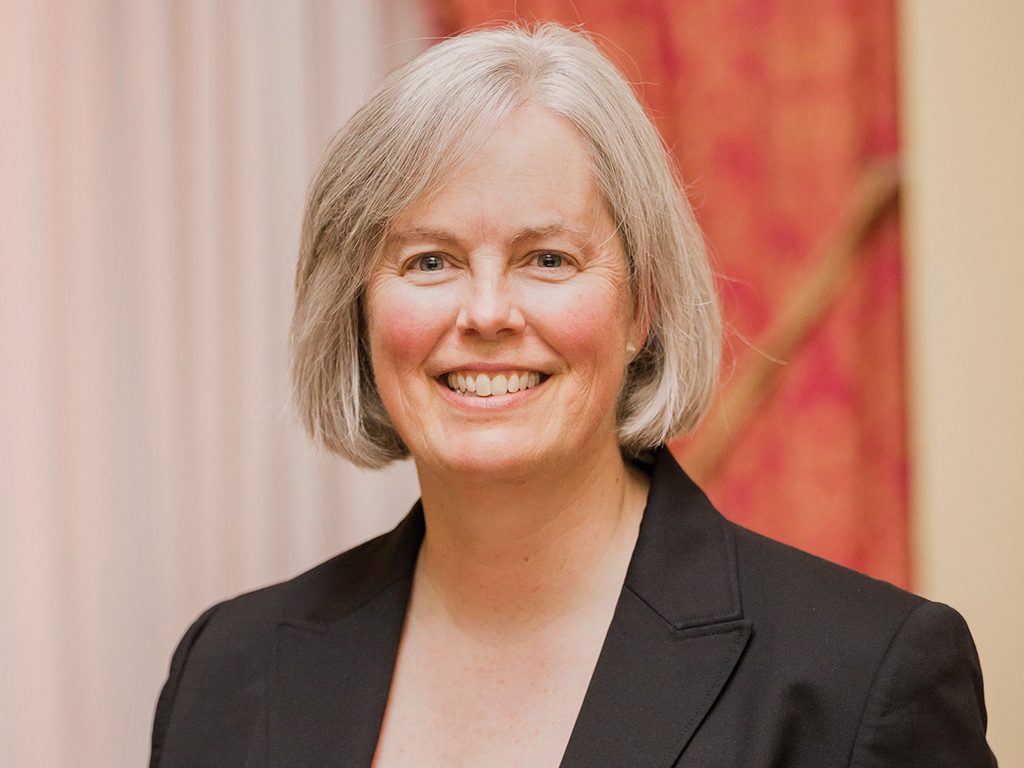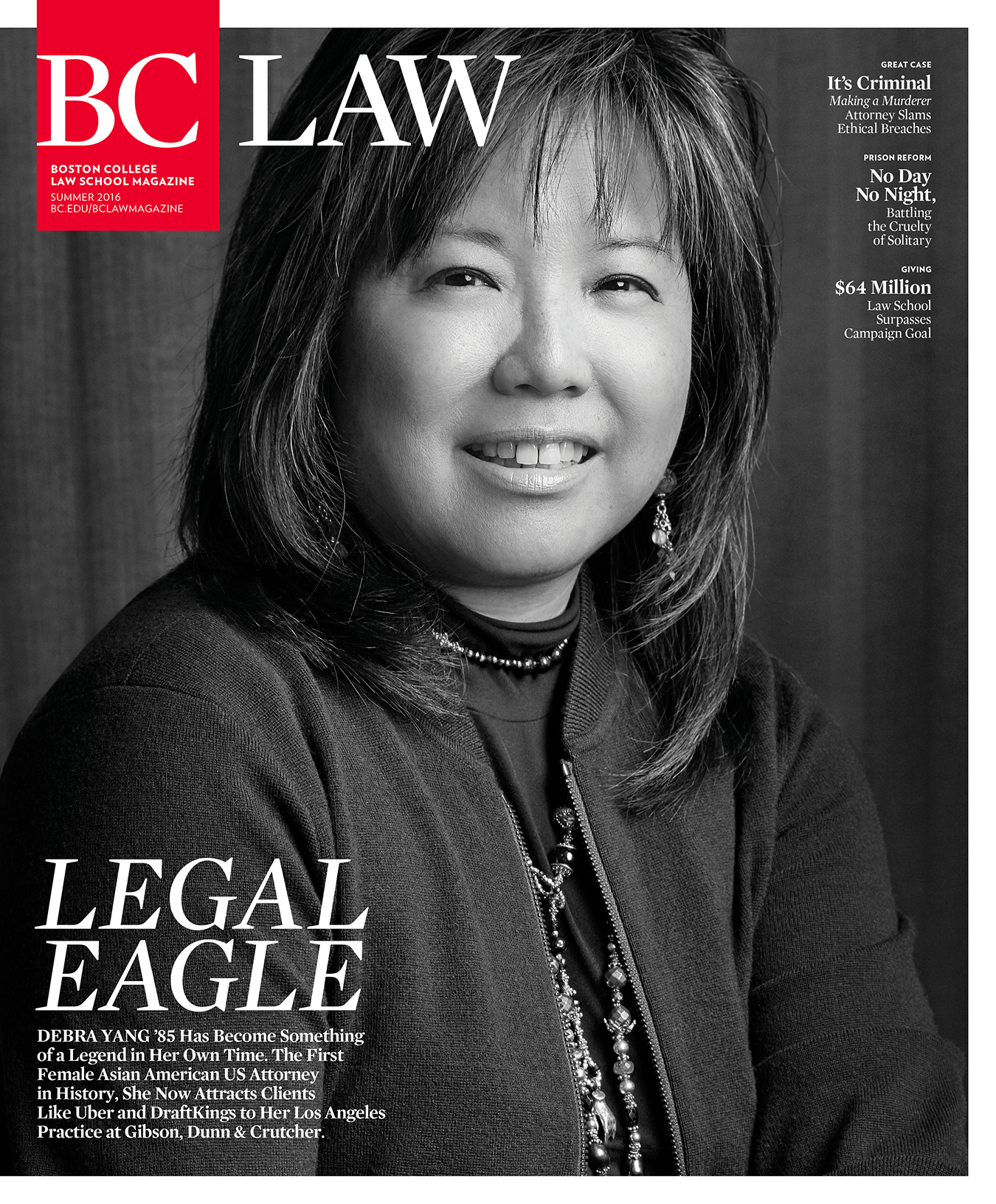From prosecuting death penalty cases in Texas to a string of high-level executive posts at a major insurance company, with a detour into the world of art dealing, Elizabeth Martin has taken some surprising turns in her career.
“You never know what’s going to happen—your best laid plans are often foiled in life,” said Martin, a straight-talking Texan who was recently named to the Dean’s Advisory Board for BC Law.
Now twenty years sober, she talks frankly about the alcoholism that dogged her after law school, and the life-saving support she received from the Lawyers Helping Lawyers hotline in Austin, Texas. “Within ten minutes, a judge I argued in front of showed up at my office and took my ass to an AA meeting, and I never looked back,” she said.
Four years out of law school, Martin was an Assistant Attorney General in the Office of the Texas Attorney General, representing the state in federal court litigation arising from challenges by death row inmates to their convictions and sentences.
“I was arguing and writing briefs to the Supreme Court—you couldn’t ask for anything more interesting,” said Martin.
Torn between professional duty and her belief that [executed murderer Karla Fay] Tucker had reformed in prison and deserved mercy, Martin resigned her post, bought a truck, and drove to Santa Fe, New Mexico, swearing never to practice law again.
But she faced an ethical quandary in a state which at the time had no public defender’s office and in which the only sentencing options for convicted murderers were life with parole or death. She was on the team of lawyers arguing the state’s case for the execution of Karla Faye Tucker. When her execution for murder in February 1998 made national headlines, Martin received death threats and was censured by the Catholic Church for her role. Torn between professional duty and her belief that Tucker had reformed in prison and deserved mercy, Martin resigned her post, bought a truck, and drove to Santa Fe, New Mexico, swearing never to practice law again.
Tucker’s case affected Martin profoundly. In 1983, in a drug-induced frenzy, Tucker had murdered her ex-boyfriend and his current girlfriend with a pickax. “She didn’t claim innocence. She didn’t even claim an unfair trial. Her only claim was that she was entitled to mercy,” said Martin, who saw in Tucker’s brokenness a reflection of her own struggles with alcoholism. “I was white, privileged, educated, and lucky,” she reflected, “and when I reached out, someone was there to grab my hand and extend the lifeline.” But nobody was there to help Karla Faye Tucker and so many other defendants Martin saw in desperate need of treatment and services.
In Santa Fe, Martin found refuge in the art world, familiar from childhood in an artistic family. While running a contemporary art gallery, co-owning an art shop, and ultimately serving as executive director of the Santa Fe Center for Contemporary Arts, she encountered many artists. Learning about their legal problems prompted her to get licensed and launch a private practice representing clients from across the spectrum of the arts and philanthropy.
That new life was derailed in 2002, when Martin suffered a brain aneurysm while exercising on a treadmill. “It was a hard climb back—two years. I was brain injured, and I had to appeal my insurance company eighteen times,” she recalled. Vowing that nobody should have to fight so hard for essential health care, after recovery she started volunteer work as an advocate for people with mental illness and substance abuse issues. Her name came to the attention of insurance giant United Health Care, then looking to invest $23 million in supportive housing in New Mexico.
“I’m a nonprofit advocate, I’m a card-carrying member of the ACLU, I’m about as liberal as you can get, with a conservative company knocking on my door,” said Martin. After several refusals, she answered the knock, structured the housing deal, and started a ten-year progression through United’s Optum companies, first as CEO of the New Mexico program, and then as national Vice President of Program & Network Integrity, charged with rooting out waste and fraud in health care initiatives serving around 60 million people in 39 states. “I did not choose health care, it chose me,” said Martin, whose passion for delivering “the right care at the right time in the right place” is fueled by her own hard-won personal and professional battles.
Martin’s latest move, in December 2015, has taken her operational experience into the policy arena, as a vice president at the Washington, DC, health and human services consulting firm The Lewin Group, another Optum company that acts as consultant to the federal government and several states.
“The public sector is a place of incredible need,” said Martin, and she sees her new role as a chance to drive positive change on an even larger scale by advising on “policy and innovative ideas that start with government endorsement and funding.”
Photo: Elizabeth Martin, whose career moves have been inspired by injustices, moved into the health care field after it took eighteen appeals for her insurance company to honor her claim for a brain aneurysm she suffered.



